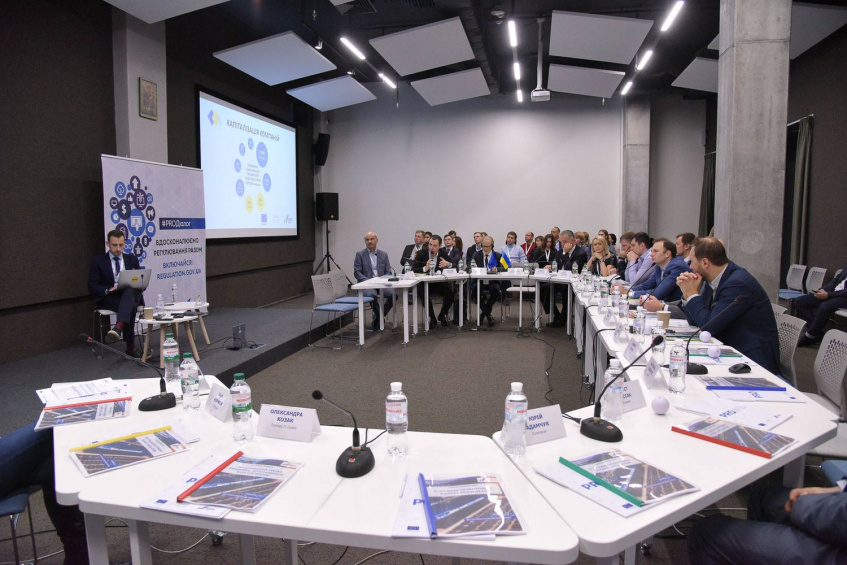
The IT industry in Ukraine has a huge potential for growth, but instability of tax regulation, lack of specialists and a number of regulatory barriers are constraining the development of the industry. Ways of overcoming these barriers were discussed on November 23 by representatives of the government, IT-business and academics during a roundtable in Lviv on regulation of the software development market, organised in the framework of the Public Dialogue initiative – #PRODialog – under the EU-funded FORBIZ project, part of the EU4Business initiative in Ukraine.
The software development market is the only stable export industry in Ukraine, showing an increase of 58% for 2013-2016. Exports of software development services in 2016 amounted to $3.2 billion, which brought the industry up to third place in terms of currency revenues and provided 26% of total exports of services. The market creates more than 100,000 high-paid jobs, 56% of which are in the regions.
Three of the leading IT cities in the country are Lviv, Kharkiv and Kyiv. So, in Lviv there are 15,000 industry professionals, and the turnover of 192 local IT companies accounts for 14.4% of the city's GRP. Over the past 5 years, the Lviv IT market has tripled, turning Lviv into an IT hub. The Financial Times has included Lviv in the top 10 cities of the future, one of the most attractive investment IT centres in Europe.
Powerful economic multiplier
The industry is a powerful economic multiplier: 1 workplace in IT creates 3 more in related professions. The salary of an IT specialist is 5 times higher than the average in the country. At the same time, the high level of payment is stored not only in the capital, but also in the regions.
The Project Manager of EU4Business FORBIZ in Ukraine, Matthias Halder, stressed the importance of developing entrepreneurial potential and improving the business climate in the field: "Ukraine is one of the most attractive countries for placing orders in the field of outsourcing business processes and IT. Sustainable development of the industry should focus on ensuring sustainable taxation, the development of human capital and the elimination of customs and regulatory barriers. To make effective changes the business definitely must be involved to the dialogue."
The Better Regulation Delivery Office (BRDO) – set up under the FORBIZ project – has analysed the regulatory field of the industry and presented its findings in a Green Book. According to its expert assessment, the lack of specific industry regulation as well as the ability to work under favourable tax conditions contributed to the rapid development of the industry. The amount of direct taxes and fees paid by industry representatives has increased by 88% over the past 3 years, reaching UAH 7.1 billion in 2016. At the same time, given the volatility of the simplified taxation model, the software market is limited in the long-term planning and attraction of investments.
Self-regulated market
"This is a successful example of an efficient self-regulated market, and this should not be changed. The capitalisation of the 10 largest Ukrainian IT companies today exceeds UAH 4 billion, and unlike giants in the materials resources industry, their value is based on human capital. Provided that the state provides stable tax conditions, qualitative changes in profile education and the lifting of some regulatory barriers, the profit of the industry can double, reaching $6 billion in 2020," said the head of the BRDO IT sector, Alexander Kubrakov.
Discussions also focused on the shortage foo qualified personnel, as well as the difficulties of attracting foreign specialists to the market.
"If we invest in education, then we will witness a systemic change in the country. Young people are a powerful driver on this path. And the task of the authorities is not to prevent wise people from doing their business," said the Mayor of Lviv Andriy Sadovy.
Funded by the European Union under the EU4Business initiative, the FORBIZ project supports Ukraine’s reform agenda and its economic recovery by proposing a systemic, smart change to a more business-friendly environment with a particular focus on SMEs. The project seeks to steer a shift in policy towards greater recognition of SMEs and the vital role they play in economic recovery, while addressing the challenge of reducing regulatory burden and lessening risk for businesses.
